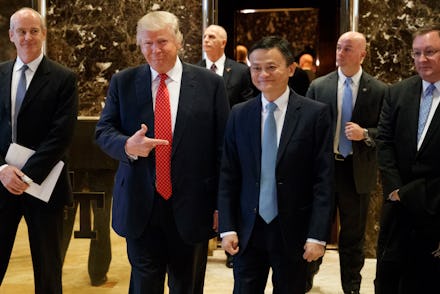Alibaba CEO met with Trump and said they'd create 1 million US jobs. Here's why some are skeptical.

On Monday, President-elect Donald Trump had an ostensibly friendly meeting with Jack Ma, one of China's leading businessmen.
Trump has not held back from criticism of China, particularly on Twitter, yet he described his time with Ma — billionaire and CEO of e-commerce company Alibaba — as a "great meeting."
Ma suggested the company would create 1 million U.S. jobs.
The basic idea is over the next five years, Alibaba will roll out products from American small businesses to sell to China's growing middle class via its e-commerce platform. Ultimately, the plan is supposed to include 1 million small businesses, which will somehow result in the creation of 1 million U.S. jobs.
But critics point out this job-creation number may be misleading.
To contextualize the number, Alibaba competitor Amazon has less than 300,000 employees around the world, which makes the idea of 1 million jobs in the United States alone sound, to put it politely, ambitious — so what could Alibaba be referring to?
Alibaba is likely talking about "job opportunities," the Washington Post reports.
This is the number of opportunities Americans could have to sell their goods on Alibaba, which isn't quite the same as a full-time — or even part-time — job.
The announcement might, therefore, be more publicity stunt than serious proposal. It's likely to be mutually beneficial for Alibaba — by legitimizing the company in the U.S. market — and for Trump, who has repeatedly promised to bring jobs back to America.
But the attention is particularly helpful for Alibaba, which was blacklisted by U.S. regulators in December 2016 for selling counterfeit products and is being investigated by the Securities and Exchange Commission for problematic accounting practices.
Monday's meeting is not the only one showing a courtship between the Trump transition team and Chinese businesses.
Jared Kushner, Trump's son-in-law and advisor, has been pursuing a deal with Anbang Insurance Group, a large Chinese company with "an ownership structure shrouded in mystery," the New York Times reported Saturday.
If Trump does not divest of his companies — particularly those that benefit from overseas businesses — he might face challenges from government watchdogs.
Sign up for The Payoff — your weekly crash course on how to live your best financial life.